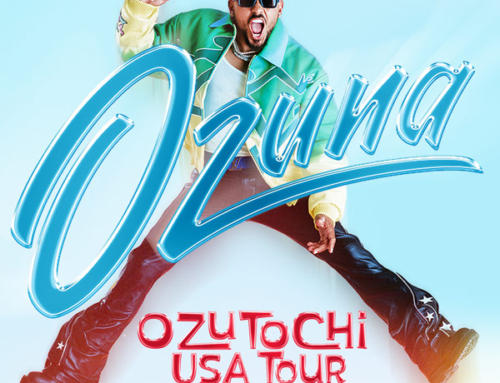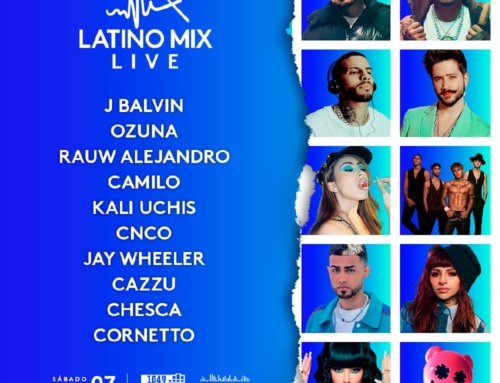Ozuna Proves He Can Slide Into Every Reggaeton Romántico Style on New Album ‘Aura’
Here’s a challenge: Find someone in urbano music who has had a better year than Ozuna. The Puerto Rican-Dominican artist soared onto the scene practically out of nowhere, dropped his full-length debut Odisea, and watched it hike up the charts, eventually breaking records on Billboard’s Top Latin Albums. A fusillade of success followed: Ozuna swept the most prestigious Billboard Latin Music Awards, he won Best New Latin Artist at the iHeartRadio Music Awards, and became the most streamed artist on YouTube.
Somewhere in between all of that, Ozuna had time to record about 20 songs for his latest album Aura. While follow-ups to massively successful debuts are often an arduous, high-pressure gambit, Ozuna appears to have churned out Aura with little difficulty: “It wasn’t about doing something bigger or better. I don’t like to proclaim things. But people ask for a lot of music; it’s different from what it was…Now artists grow weekly, there’s new sounds, new rhythms, new technology, new people, and you have to evolve,” he recently told Billboard.
A desire to experiment might explain Aura’s wide-ranging maximalism. The album follows the example of recent reggaeton-leaning albums — J Balvin’s Vibras, Maluma’s F.A.M.E. — that paint with a wide brush and reflect all of the sub-genres curdling in urbano. Aura boasts new bangers that trend on the poppy, reggaeton-romántico formulas of Odisea (“Unica,” “Vaina Loca”), but Ozuna also adds in swaths of subtler electro-R&B that we haven’t quite heard from him yet. “Monotonia” is a moody ballad, while “Besos Mojados” leverages the smooth vocals of OG reggaeton duo R.K.M. y Ken-Y.
Although new inspirations are present, Ozuna doesn’t steer too far from what worked on Odiseain terms of collaborations. He brings back many of his past co-conspirators: Nicky Jam reprises some of the melodies he lent on “Cumpleaños” and splays them out on the carnal, dembow-laced sensibilities of “Haciendolo,” and Balvin features on “Sigueme los Pasos” with Natti Natasha. Ozuna also teams up with Romeo Santos again — the two battled their falsettos on the standout track “Sobredosis” from Santos’ last album Golden, and they join up here for a breezy, stripped-back showcase called “Ibiza.” Meanwhile, Ozuna’s friend and controversial trap star Anuel AA, who is working with 6ix9ine, makes it onto two songs; one of these, “Pasado y Presente,” is easily among the album’s best, thanks to a minimal beat and auto-tune flourishes that offer the space for Ozuna and Anuel AA to fluidly trade bars.
But Aura comes with an added sense of darkness. Themes of heartbreak and deception, which popped up on Odisea (albeit sparingly), linger on “Me Dijeron” and “Montonia,” tracks that see Ozuna grappling with mistakes he’s made and people he’s lost. There’s also the existential opener, “Aura,” in which Ozuna unravels cryptic personal turmoil grounded both in his career pressures and relationships: “Engaño mi realidad/Sé que hago daño a mi mente/Pienso en lo que pensarán/Yo mismo a mi ser le miente.” Talking to Billboard, Ozuna explained that the song was a heavy one for him to record. “You know everyone’s a sinner. No one’s a saint. ‘Aura’ is a song where you’re looking at yourself in the mirror, and I was personally impacted when I recorded it. I identified with it. There are so many things happening in the world right now, and doing a song about it is painful.”
The effort is clearly a way to showcase a deeper side of Ozuna, who has never avoided sharing personal narratives. (Odisea’s first song was a quick primer about the artist’s early life.) Still, the range in subjectivity and energy has one side effect: It makes Aura seem less focused than its predecessor. Odisea was also a testament to Ozuna’s versatility that reflected myriad influences, but it felt like a tighter, closer-knit presentation, plotted carefully to introduce Ozuna to the masses. It was a shorter project, too, with 16 songs that clocked in at less time than Aura’s 20. In many ways, Aura can be understood as a compendium that pools Ozuna’s bangers together and keep his momentum going, but is less interested in appearing as a cohesive album. Instead, the conceit is to flaunt Ozuna’s aptitude for making hits, no matter the genre, and show just how much he can do when he’s given the opportunity.
Given Ozuna’s knack for racking up millions of streams per release, none of this is necessarily a bad thing. His singles collect thousands of views as soon as their launched on YouTube (a video for “Me Dijeron” posted four hours from this review already had 200,000 hits), and Ozuna has consistently proven that he can slide into whatever style the industry is moving toward. With a tendency to keep moving so fast, Ozuna could easily end up one of the most prolific artists in urbano.





